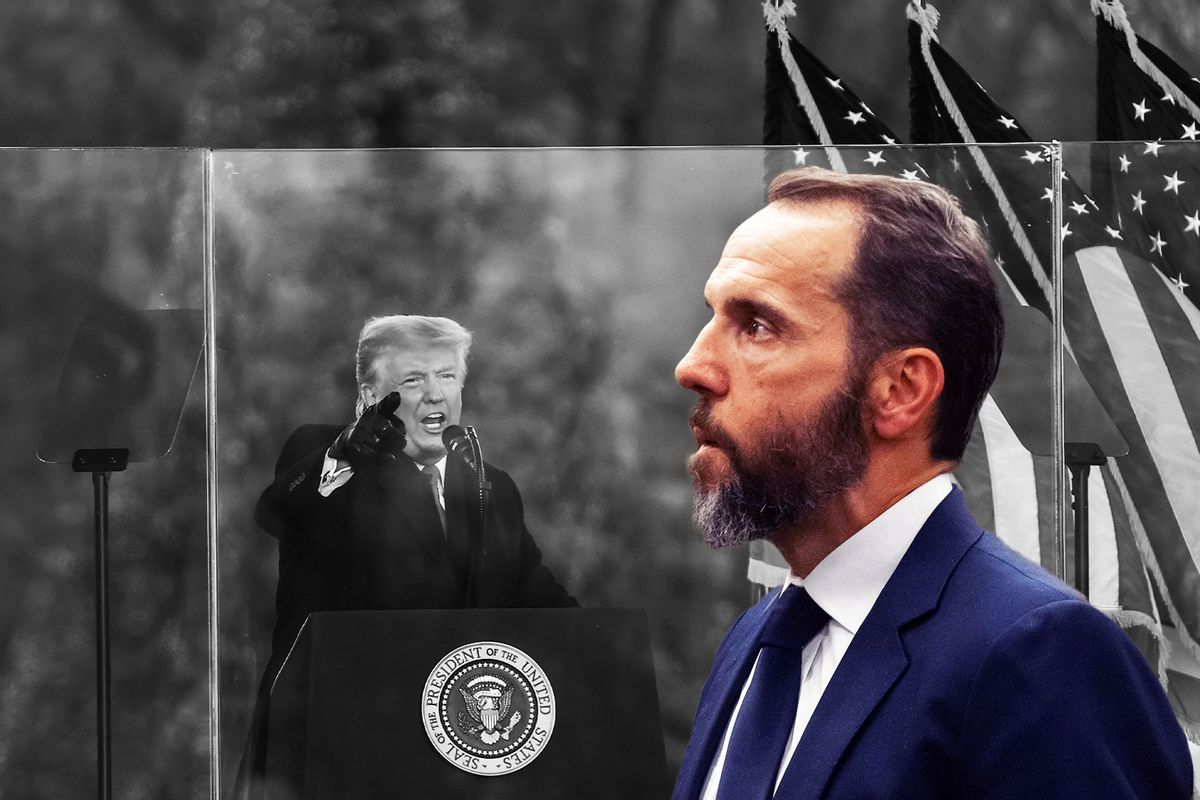The Supreme Court's lack of clarity in its presidential immunity ruling's definition of "official" conduct leaves room for former President Donald Trump to fight the refiled indictment alleging he conspired to thwart the results of the 2020 presidential election.
On Tuesday, Special Counsel Jack Smith filed a slimmed down indictment — which he secured from a grand jury that only heard streamlined evidence.
Smith's new indictment again includes four felony charges against Trump but excluded evidence concerning Trump's official conduct in office, including the removal of former DOJ official Jeff Clark and his alleged efforts to place him in control of the department to pursue his election fraud claims.
Legal observers say the refiled indictment has an overall stronger chance of holding up on appeal by excluding evidence that appears to fall squarely into the Supreme Court's definition of official conduct in last month's ruling.
But some legal experts warn that the refiled indictment isn't a slam dunk.
"It’s not clear whether this will work, because on appeal the Supreme Court can manipulate the category of official conduct to create a broader immunity covering other elements of the indictment," said Syracuse University law professor David Driesen, an expert in constitutional law and the author of the book “The Specter of Dictatorship: Judicial Enabling of Presidential Power.”
In July, the Supreme Court ruled 6-3 that presidents have "absolute immunity from criminal prosecution" for acts that fall within the "exercise of his core constitutional powers he took when in office."
Presidents, according to the ruling, have "at least presumptive" immunity from other official acts, and no immunity for unofficial acts.
In a section of the ruling that drew 5-4 support from justices, the ruling also stated that prosecutors can't present evidence of official acts when charging former presidents.
Dissenting justices warned that the ruling would empower presidents to use their official power for political and private reasons to escape accountability.
And Dreisen said the ruling still leaves room for Trump to topple any convictions.
“It’s difficult to know whether Trump will end up in prison or not," Dreisen said. "The Supreme Court has been very creative in protecting MAGA misdeeds. It ruled, for example, that invading the Capitol is not an obstruction of an official proceeding, thereby wiping out some criminal convictions of Jan. 6 insurrectionists."
We need your help to stay independent
Dreisen added that the fact that Smith felt he had to refile the indictment in the first place is troubling.
“The Supreme Court ruling clearly overrode longstanding constitutional norms forbidding presidents from issuing orders to investigate political opponents or to challenge election results," Dreisen said. "The forcing of these amendments to the indictment highlights how the high court has opened the door wide to autocracy.”
University of Texas Law professor Lee Kovarsky said the indictment is "weaker than what it was."
"The allegations about Jeffrey Clark and Trump's attempt to have DOJ intimidate states with false accusations about widespread voter fraud was extremely incriminating, and now it's gone," he said on X.
He called the new indictment a "smart move" — but agreed that Trump could dispute how Smith characterized and described his alleged conduct.
"Amendments to the [superseding indictment] ensure that DOJ won't accidentally plead itself into an immunity problem, but the Trump folks will still have a chance to dispute the [superseding indictment's] characterization of various conduct, in an attempt to have it designated as official, & potentially immunized," Kovarsky wrote.
Trump has complained that the superseded indictment violates the DOJ's practice of avoid filing new criminal charges or undertaking investigative activities within 60 days of an election.
But former federal prosecutor and University of Michigan Law School professor Barb McQuade told Salon: "These are not new charges or new investigative activity, but rather following the guidance of the Supreme Court to advance a pending case."
McQuade noted that Smith included Trump‘s conduct to pressure Mike Pence to block the certification of the election.
"Smith characterizes Pence as acting in his role as president of the Senate when counting votes, but I expect Trump to argue that any conversations between him and the vice president is core executive activity," McQuade said. "This is the only set of allegations that strike me as potentially protected by immunity. The remaining allegations seem to be clearly unofficial acts that should be fair game for prosecution."
If Trump wins, McQuade expects he'll direct his attorney general to dismiss the case.
Otherwise, she said it's likely the case will go up to the Supreme Court before any trial as the court figures out how to apply the immunity ruling to the allegations.
"That means trial in this case likely will not occur until a year or so from now," she said.



Shares